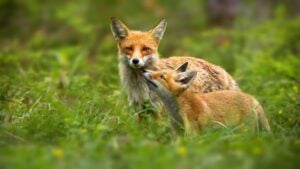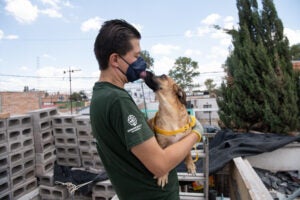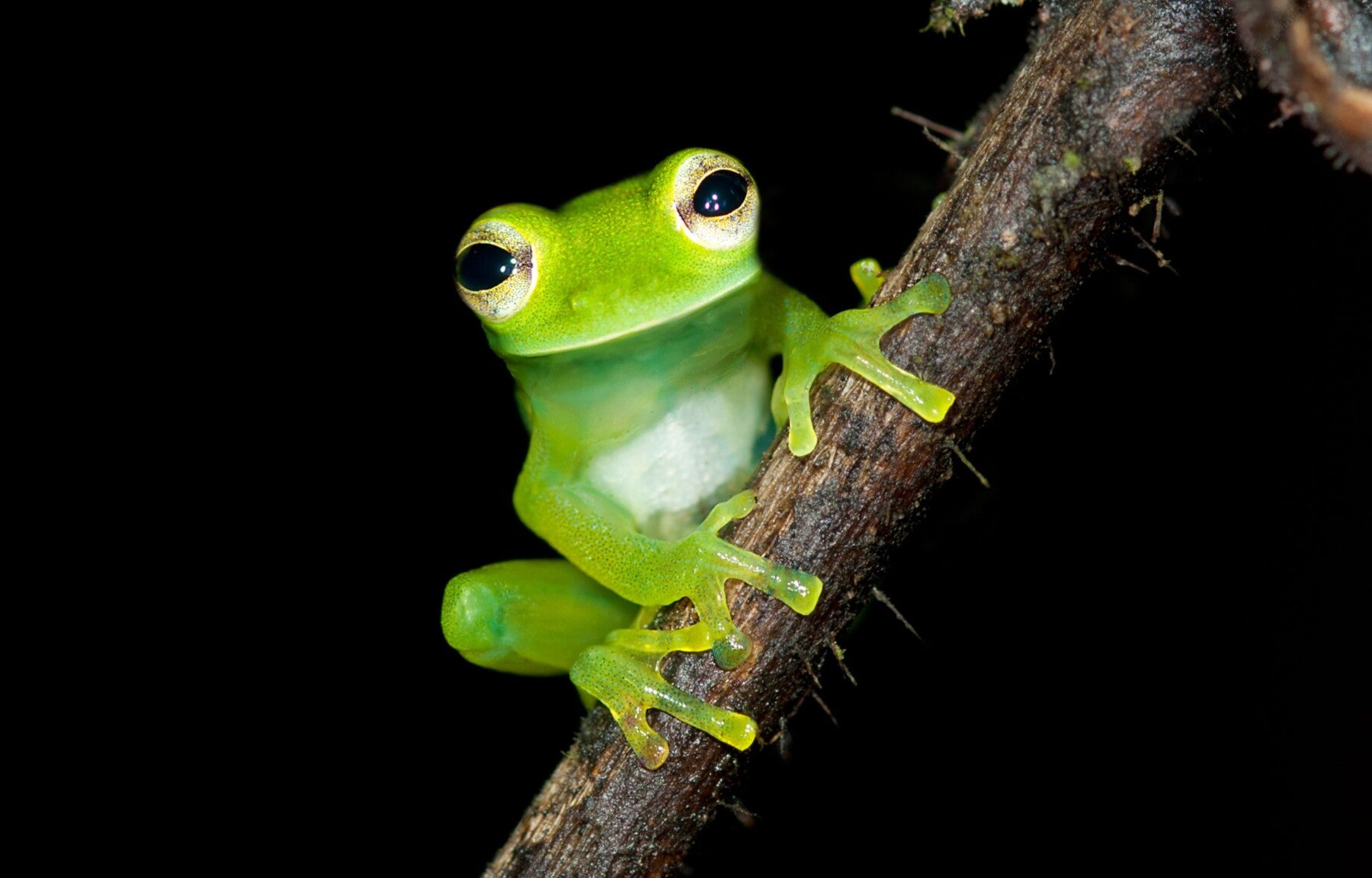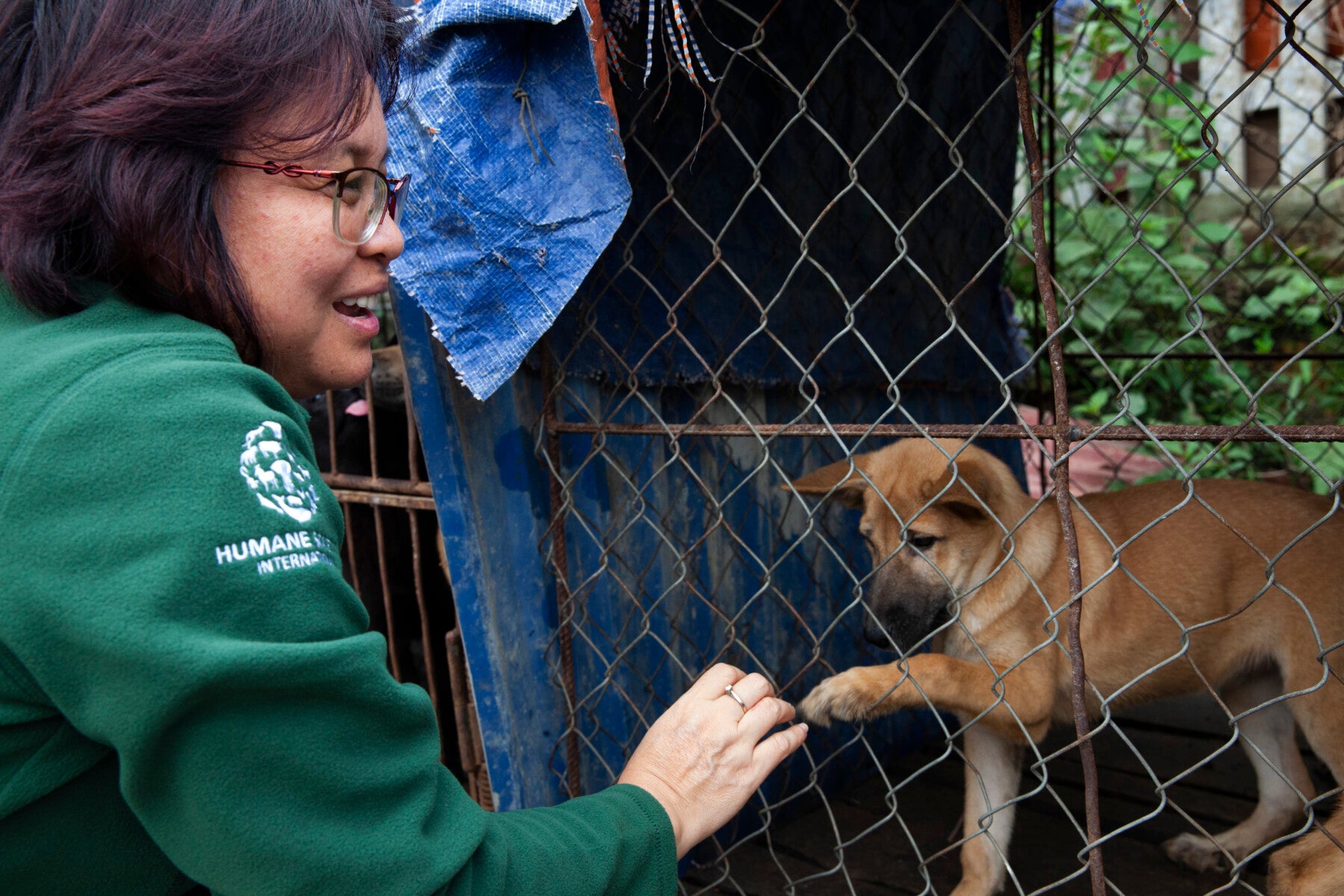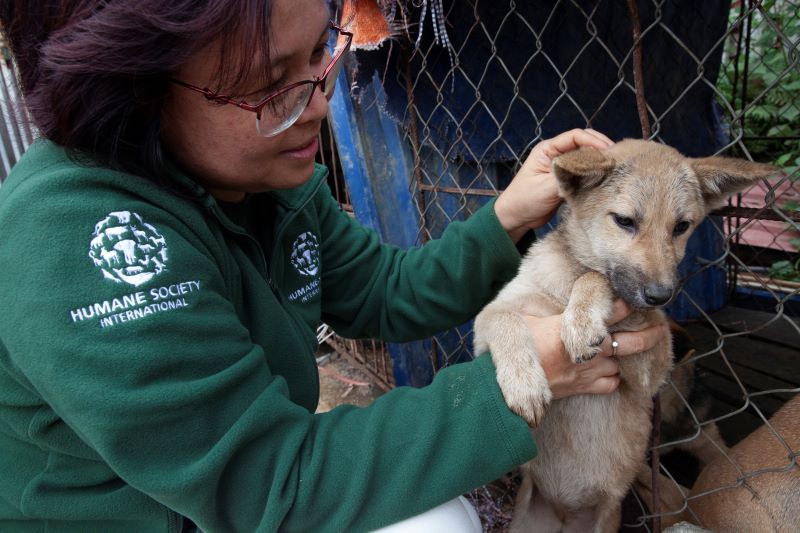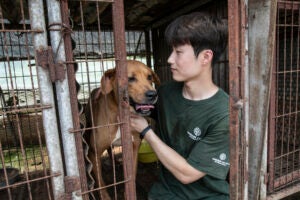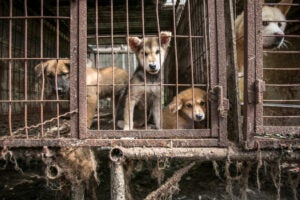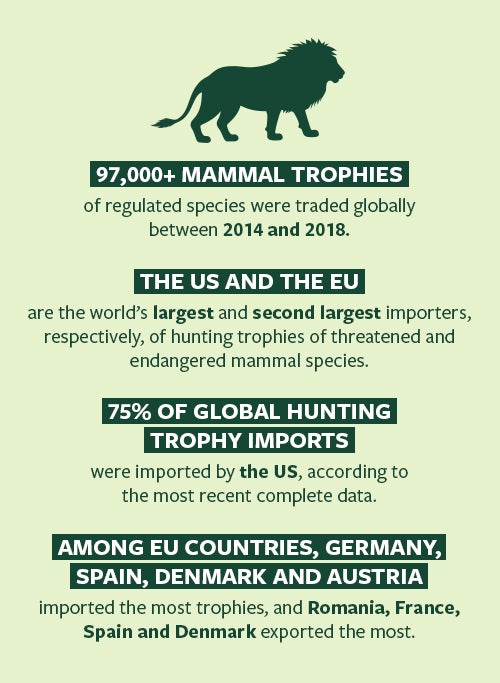
When looking for your next flight, the Humane Society family of organizations urges you to consider airlines that currently have a hunting trophy transport ban.
Humane Society International is fighting to end trophy hunting around the world for good. The transport industry has a stake in the harmful global trade in hunting trophies. Therefore, we are working with major players to help them implement policies prohibiting the transport of hunting trophies.
Trophy hunting is killing animals for the purpose of acquiring parts or all of the animals for display. Trophy hunters do not kill animals in order to eat them. A hunting trophy is the dead animal, or the parts of an animal such as its head, skin, claws, teeth or any other body part, that the hunter keeps as a souvenir, decoration or display to represent the success of his or her hunt.
Airlines, freight carriers, and other businesses in the transport sector are in a unique position to protect wild animals from extinction due to exploitation. Each year, hundreds of thousands of animals, including endangered and threatened species, are killed by trophy hunters worldwide. Being able to transport a hunting trophy home is a key motivation for trophy hunting. Hunting trophy transport bans are aimed at reducing the number of trophies being transported, thereby reducing the animals being killed in countries worldwide.
Policies to ban trophy transport
Hunting trophies are transported home by air and other modes of transportation. By air, the hunting trophy can be carried onboard by a passenger as cabin luggage or as checked baggage. The hunting trophy can also be transported as cargo in a plane without a passenger. The passenger airline and the cargo handler are often different companies using the same plane. We make clear distinctions between passenger baggage and freight policy restrictions. It is important that airline policies include both baggage and cargo prohibitions. Without such a distinction and without strict, published company policies that include hunting trophies as prohibited items, trophy hunters may continue to easily and cost-effectively transport their hunting trophies through major airlines.
Fortunately, a growing number of airlines, cargo handlers and other companies in the transportation industry are saying “no” to hunting trophies by instituting policies to prohibit the transport of hunting trophies in baggage and/or cargo. The companies listed below have included hunting trophy bans in their online baggage and cargo policies.
Reference to any specific brand, trade, firm or corporation name is for the information of the public only, and does not constitute or imply endorsement by Humane Society International or its affiliates of any specific provider or its products or services. Links and access by hypertext to other websites is provided as a convenience only and does not indicate any endorsement with respect to any of the content on such websites. The information is obtained from public sources believed to be reliable, but is in no way guaranteed regarding the accuracy or completeness of the information provided.
A | B | C | D | E | F | G | H | I | J | K | L | M | N | O | P | Q | R | S | T | U | V | W | X | Y | Z
No * = Passenger airline
* = Freight and cargo
** = Other in transport industry
A
Aerolíneas Argentinas | Argentina
Product list of prohibited and restricted items in luggage: Hunting Trophies (Argentine Autochthonous Fauna) – The transport of hunting trophies is prohibited on all company flights, both in domestic and international flights. Important: this prohibition does not apply to invasive alien species for which the necessary documentation is available for export. In such cases, the dispatch must be carried out by Cargo. Last accessed March 30, 2023. (See https://www.aerolineas.com.ar/es-ar/equipaje/restringidos?utm_source=Website&utm_medium=Banner%20inferior%20de%20informaciones%20varias&utm_campaign=Art%C3%ADculos%20restringidos&artid=aeswbgi763)
AeroMéxico | Mexico
Forbidden and restricted baggage: Exotic species and hunting trophies – In order to protect Mexico’s biodiversity and natural heritage, AeroMéxico prohibits transporting hunting trophies on all its routes, both domestic and international. We also work with the corresponding authorities to prevent illegal-exotic-species traffic as well as its products and byproducts. Last accessed March 30, 2023. (See https://aeromexico.com/en-nl/travel-information/baggage/forbidden-restricted-bagggage)
AeroMéxico Cargo | Mexico *
Dangerous goods forbidden by Aeromexico Cargo – The following items cannot be shipped by Aeromexico Cargo due to various corporate commitments, laws and restrictions mandated by Aviation Security:
Trophy hunting animals. Last accessed March 30, 2023. (See https://amcargo.aeromexico.com/content/4-envios/1-limitaciones/prohibited_en.pdf)
Air France | France
Prohibited and regulated goods – 14 – Protected animals and plants -The illegal trade and transport of endangered animals and plants, or products derived from these protected species, is a growing threat to biodiversity. The following are strictly prohibited:
. the transport of hunting trophies (even if legally obtained) on all flights, in the hold, cabin, or cargo,
. the import of protected* animal or plant species, whether whole bodies or parts of living or non-living species.
Please don’t put yourself in an illegal situation, and stand by our side: check the legality of the products you carry, whether in the hold or the cabin.
* The list of protected species is defined by CITES (Convention on International Trade in Endangered Species of Wild Fauna and Flora)
Last accessed May 23, 2024. (See https://wwws.airfrance.nl/information/bagages/produits-interdits-et-reglementes#14)
Air France Cargo | France *
Prohibited and regulated goods – 14 – Protected animals and plants -The illegal trade and transport of endangered animals and plants, or products derived from these protected species, is a growing threat to biodiversity. The following are strictly prohibited:
. the transport of hunting trophies (even if legally obtained) on all flights, in the hold, cabin, or cargo,
. the import of protected* animal or plant species, whether whole bodies or parts of living or non-living species.
Please don’t put yourself in an illegal situation, and stand by our side: check the legality of the products you carry, whether in the hold or the cabin.
* The list of protected species is defined by CITES (Convention on International Trade in Endangered Species of Wild Fauna and Flora)
Last accessed May 23, 2024. (See https://wwws.airfrance.nl/information/bagages/produits-interdits-et-reglementes#14)
Air New Zealand Cargo | New Zealand *
International restrictions & prohibitions – Prohibited items – Hunting trophies: Lion, leopard, elephant, rhinoceros and buffalo hunting trophies. Last accessed May 28, 2024. (See https://www.airnewzealandcargo.com/international-cargo-prohibited-for-travel)
American Airlines Cargo | United States *
Policies and Restrictions: Other Regulations: Pet Policy – American Airlines does not transport the following wild game trophies: elephant, lion, water buffalo, rhinoceros, or leopard. We reserve the right to refuse any wild game hunting trophy shipment. American Airlines also does not transport shark fins and shark fin products, in any form or packaging type. Last accessed March 30, 2023. (See https://www.aacargo.com/learn/animals-policy-and-restrictions.html#aircraft-restrictions)
B
Buzz (Ryanair) | Poland
8.9 PROHIBITED ITEMS – Passengers are not allowed to bring into the security zone at the airport, as well as to carry the following items in their hand or checked baggage… 8.9.8 Fish or trophies from fishing and hunting. Last accessed March 30, 2023. (See https://www.buzzair.com/en/terms-conditions-of-carriage/#8-9-przedmioty-zakazane)
C
Cargolux | Luxembourg *
Embargoed goods – As a company strongly focused on Corporate Social Responsibility and sustainability, Cargolux has a growing list of items that it will not carry, on any of its network routes, for ethical and legal reasons. Cargolux has imposed the following commercial and/or regulatory embargoes:
Hunting trophies, any type/species. Last accessed March 30, 2023. (See https://www.cargolux.com/Our-Expertise/Embargoed-Goods)
Cargolux Italia | Italy *
Embargoed goods – As a company strongly focused on Corporate Social Responsibility and sustainability, Cargolux has a growing list of items that it will not carry, on any of its network routes, for ethical and legal reasons. Cargolux has imposed the following commercial and/or regulatory embargoes:
Hunting trophies, any type/species. Last accessed March 30, 2023. (See https://www.cargolux-italia.com/Our-Expertise/embargoed-goods)
Cathay Pacific Cargo | China *
Sustainable development cargo carriage policy: Wildlife – Not knowingly facilitate or tolerate the carriage of illegal wildlife products, or game or hunting trophies (including legally hunted or legally acquired trophies). The Company understands that research will be on-going and the determination of good practice is a dynamic process, meaning this Policy will evolve over time. Last accessed March 30, 2023. (See https://www.cathaypacificcargo.com/en-us/helpsupport/specialcargohandlingprocedures/sustainabledevelopmentcargocarriagepolicy.aspx)
Condor | Germany
Condor is committed to combating unsustainable and illegal wildlife trade, in accordance with CITES* regulations, and has a zero tolerance policy towards the transport of endangered and threatened species, hunting trophies (including legally hunted or legally acquired trophies) or other products associated with illegal wildlife activities, as carry-ons or checked baggage. Training is provided, in accordance with IATA guidelines for animal transport, which includes close scrutiny of documents and examination of transport containers. Last accessed March 30, 2023. (See https://www.condor.com/us/flight-preparation/baggage-and-animals/travelling-with-pets.jsp)
*Convention on International Trade in Endangered Species of Fauna and Flora
Corendon Dutch Airlines | The Netherlands
Forbidden Items – In connection with flight safety on board, the following items, both in hand baggage and in hold baggage, are not permitted: Trophies of (parts of) animals resulting from hunting, even when obtained legally. Last accessed March 30, 2023. (See https://www.corendon.nl/bagage#verboden-items)
D
Delta Cargo | United States *
Restrictions – Delta Cargo prohibits the following: Shipping hunting trophies such as lion, leopard, elephant, rhino and buffalo. Last accessed March 30, 2023. (See https://www.deltacargo.com/Cargo/catalog/products/specialized-live?from=home)
DHL Express | Germany *
Prohibited Commodities – Hunting (Animal) trophies, animal parts such as ivory and shark fins, animal remains, or Animal-by-Products and derived products not intended for human consumption, prohibited for movement by the CITES Convention and/or local law. Last accessed March 30, 2023. (See https://www.dhlexpress.nl/en/shipping/business/what-can-i-ship)
DHL Parcel | Germany **
DHL does not ship the following products: Certain rules apply to the content of your parcel. For security reasons we do not ship the following items: Animals (including insects), parts of animals (also fur and ivory) and hunting trophies. Last accessed March 30, 2023. (See https://www.dhlparcel.nl/en/consumer/support/sending/not-allowed-ship#:~:text=For%20security%20reasons%20we%20do,valuable%20documents%20such%20as%20passports)
E
easyJet Europe | Austria
Terms and Conditions: Dangerous Goods and Items Unacceptable as Baggage – 13.18 You must not include in your Baggage the items listed below: …13.18.6 human or animal remains. Last accessed March 30, 2023. (See https://www.easyjet.com/en/terms-and-conditions)
easyJet Switzerland | Switzerland
Terms and Conditions: Dangerous Goods and Items Unacceptable as Baggage – 13.18 You must not include in your Baggage the items listed below: …13.18.6 human or animal remains. Last accessed March 30, 2023. (See https://www.easyjet.com/en/terms-and-conditions)
easyJet UK | United Kingdom
Terms and Conditions: Dangerous Goods and Items Unacceptable as Baggage – 13.18 You must not include in your Baggage the items listed below: …13.18.6 human or animal remains. Last accessed March 30, 2023. (See https://www.easyjet.com/en/terms-and-conditions)
Emirates | United Arab Emirates
Protecting wildlife: Emirates has a zero tolerance policy on carrying banned species, hunting trophies or any products associated with illegal wildlife activities. Over the years, we’ve continually demonstrated our strong commitment to supporting CITES (Convention on International Trade in Endangered Species of Wild Fauna and Flora) protocols in collaboration with entities such as the UAE Ministry of Climate Change and Environment. Last assessed October 27, 2023. (See https://www.emirates.com/ae/english/about-us/our-planet/preserving-wildlife-and-habitats/)
Emirates SkyCargo | United Arab Emirates *
POLICY ON HUNTING TROPHIES AND PRODUCTS UNDER CITES APPENDIX 1: As a signatory to the Buckingham Palace Declaration (BPD) and operating in compliance with the Convention on International Trade in Endangered Species of Wild Fauna and Flora (CITES), as well as the IATA Live Animals Regulations (LAR), Emirates has a zero-tolerance policy on the carriage of banned species, hunting trophies or any product associated with illegal wildlife trade. We will not accept the following for carriage:
1. Products and parts of endangered animals, including hunting trophies, and plants (listed in CITES Appendix I)
2. Hunting trophies of elephants, rhinoceros, lions, and tigers
A complete list of restricted wildlife shipments can be found in the IATA Live Animals Regulations (LAR) manual (under the Emirates Operator Variations).
Emirates proudly holds the IATA Illegal Wildlife Trade (IWT) certification, underscoring our stance on a zero-tolerance policy towards the illegal trade of wildlife and wildlife products worldwide. Last assessed 27/10/2023 (See https://www.skycargo.com/report-illegal-wildlife-trading/)
Etihad Airways | United Arab Emirates
Animal welfare and conservation policy – The Carriage of Animals, Plants and Their Products: We recognise that many animal and plant species around the world are in danger of extinction if efforts are not made to protect them, and that the trade in animals, plants and their products can negatively impact their survival. With this in mind, Etihad is committed to the conservation of species of animals, plants, and their products, and will not knowingly accept the carriage of: Hunting trophies derived from or containing any parts of animal origin, whether the animal concerned was wild born or bred in captivity. Last accessed March 30, 2023. (See: https://www.etihadaviationgroup.com/content/dam/eag/corporate/etihadaviation/en-ae/desktop2/pdfs/Animal_Welfare_and_Conservation_Policy.pdf)
Etihad Cargo | United Arab Emirates *
Animal welfare and conservation policy – The Carriage of Animals, Plants and Their Products: We recognise that many animal and plant species around the world are in danger of extinction if efforts are not made to protect them, and that the trade in animals, plants and their products can negatively impact their survival. With this in mind, Etihad is committed to the conservation of species of animals, plants, and their products, and will not knowingly accept the carriage of: Hunting trophies derived from or containing any parts of animal origin, whether the animal concerned was wild born or bred in captivity. Last accessed March 30, 2023. (See: https://www.etihadaviationgroup.com/content/dam/eag/corporate/etihadaviation/en-ae/desktop2/pdfs/Animal_Welfare_and_Conservation_Policy.pdf)
F
Finnair | Finland
Special cargo – Finnair has placed an embargo concerning hunting trophies, including their skin/hide and all articles made from or containing parts of such animals. Last accessed November 9, 2023. (See https://company.finnair.com/en/sustainability/environmental-sustainability)
Finnair Cargo | Finland *
Special cargo – Finnair has placed an embargo concerning hunting trophies, including their skin/hide and all articles made from or containing parts of such animals. Last accessed March 30, 2023. (See https://cargo.finnair.com/en/products/special-cargo)
I
ITA Airways | Italy
Baggage – Restricted and prohibited items – Hunting trophies –
In compliance with ITA Airways’ ESG (Environment, Social and Governance) commitments, we intend to contribute to protecting biodiversity and promoting the protection and conservation of wild fauna, as envisaged by the goals of CITES (the Convention on International Trade in Endangered Species of Wild Fauna and Flora). To this end, ITA Airways has joined the “Humane Society International” campaign, and formally bans the transport of all hunting trophies (including individual parts of animals) on all its flights, both in cargo shipments and in passengers’ checked baggage.
In this way, ITA Airways wishes to express its support for the two bills, currently being examined by the Italian Parliament, for zero tolerance towards the importation, exportation and re-exportation of such items, as indicated by the European Parliament’s Convention. Last accessed November 30, 2023. (See https://www.ita-airways.com/en_en/fly-ita/baggage/restricted-and-prohibited-items.html)
ITA Airways Cargo | Italy *
Baggage – Restricted and prohibited items – Hunting trophies –
In compliance with ITA Airways’ ESG (Environment, Social and Governance) commitments, we intend to contribute to protecting biodiversity and promoting the protection and conservation of wild fauna, as envisaged by the goals of CITES (the Convention on International Trade in Endangered Species of Wild Fauna and Flora). To this end, ITA Airways has joined the “Humane Society International” campaign, and formally bans the transport of all hunting trophies (including individual parts of animals) on all its flights, both in cargo shipments and in passengers’ checked baggage.
In this way, ITA Airways wishes to express its support for the two bills, currently being examined by the Italian Parliament, for zero tolerance towards the importation, exportation and re-exportation of such items, as indicated by the European Parliament’s Convention. Last accessed November 30, 2023. (See https://www.ita-airways.com/en_en/fly-ita/baggage/restricted-and-prohibited-items.html)
K
KLM Cargo | The Netherlands *
4.3.3 Impact on Biodiversity – Through its membership of IATA, the Group is also committed to full compliance with CITES (Convention on International Trade in Endangered Species of Wild Fauna and Flora). Air France and KLM also have a worldwide policy prohibiting the transportation of hunting trophies (even when obtained legally) on board all their flights, in checked luggage, carry-on baggage and cargo. Last accessed May 27, 2024. (See https://www.airfranceklm.com/sites/default/files/2024-04/af_urd_2023_uk_vmel2_260424.pdf)
KLM Royal Dutch Airlines | The Netherlands
Restricted items in checked baggage: Prohibited items – You are not allowed to bring the following items in your checked baggage: Products of animal origin. You cannot bring any products of animal origin that are the result of hunting, including (parts of) animals. Last accessed March 30, 2023. (See https://www.klm.nl/en/information/baggage/restricted-items-checked-baggage#prohibited-items)
L
LOT Cargo | Poland *
Embargo Restrictions – Goods that are not accepted on PLL LOT aircrafts: Others: Hunting trophies. Last accessed May 27, 2024. (See https://www.lot.com/pl/en/cargo/products/restrictions)
M
Malta Air (Ryanair) | Malta
General terms & conditions (06 Sep 2021) – 8.9 Prohibited items: 8.9.4 Fish, birds or any animals killed and kept as hunting trophies. Last accessed March 30, 2023. (See https://www.ryanair.com/gb/en/useful-info/help-centre/terms-and-conditions1)
R
Ryanair DAC Ireland | Ireland
General terms & conditions (06 Sep 2021) – 8.9 Prohibited item: …8.9.4 Fish, birds or any animals killed and kept as hunting trophies. Last accessed March 30, 2023. (See https://www.ryanair.com/gb/en/useful-info/help-centre/terms-and-conditions/termsandconditionsar_696869348)
Ryanair UK | United Kingdom
General terms & conditions (06 Sep 2021) – 8.9 Prohibited items: …8.9.4 Fish, birds or any animals killed and kept as hunting trophies. Last accessed March 30, 2023. (See https://www.ryanair.com/gb/en/useful-info/help-centre/ryanair-uk-terms-and-conditions0)
S
Swiss International Air Lines | Switzerland
Pets & Live Animals – At Swiss International Air Lines – and at Swiss WorldCargo – we dissociate ourselves from the transportation of live animals for research; in fact, SWISS does not accept any live animals destined for research for transport on any of its routes except live mice and live rats. Swiss WorldCargo complies with the Convention on International Trade in Endangered Species of Wild Fauna and Flora (CITES) when it comes to the transportation of animals and has a ban in place on animal trophies as per CITES Appendix I (see http://www.cites.org/). A ban on ivory has already been in place for some time. In order to further help eliminate illegal trade and transportation of hunting trophies and save wildlife heritage, since 1 June 2015, we have extended the ban to the transportation of lion trophies as well as lion bones and body parts (CITES Appendix II). SWISS hopes these bans will finally contribute to stopping this cruel practice. Last accessed March 30, 2023. (See https://www.swissworldcargo.com/en/pets_live_animals)
Swiss WorldCargo | Switzerland *
Pets & Live Animals – At Swiss International Air Lines – and at Swiss WorldCargo – we dissociate ourselves from the transportation of live animals for research; in fact, SWISS does not accept any live animals destined for research for transport on any of its routes except live mice and live rats. Swiss WorldCargo complies with the Convention on International Trade in Endangered Species of Wild Fauna and Flora (CITES) when it comes to the transportation of animals and has a ban in place on animal trophies as per CITES Appendix I (see http://www.cites.org/). A ban on ivory has already been in place for some time. In order to further help eliminate illegal trade and transportation of hunting trophies and save wildlife heritage, since 1 June 2015, we have extended the ban to the transportation of lion trophies as well as lion bones and body parts (CITES Appendix II). SWISS hopes these bans will finally contribute to stopping this cruel practice. Last accessed March 30, 2023. (See https://www.swissworldcargo.com/en/pets_live_animals)
T
TAP Air Cargo | Portugal *
Why choose TAP Air Cargo for the air transport of animals? – Since 2015, TAP has prohibited the shipment of animal trophies, laboratory animals, shark fins and any part of animals that appear on the list of “Endangered Animals”, as freight. Last accessed March 30, 2023. (See https://www.tapcargo.com/en/products/air-transport-of-animals)
Transglobal Express | United Kingdom **
Dangerous, Hazardous & Prohibited Items: The following are Prohibited Items and are not accepted by any of our carriers: Animals & Animal Products: Includes Animal fur and skin, hunting trophies (including legally acquired), and other animal products. Last assessed 08/11/2023 (See https://www.transglobalexpress.co.uk/information/dangerous-and-hazardous/)
U
United Cargo | United States *
Rates, rules and regulations – Packing and labeling: United restricts the shipment of lion, buffalo, elephant, leopard or rhinoceros trophies as freight. United ships other trophies, following all U.S. domestic and international regulations, which prohibit the possession of trophies or other items associated with protected species. Last accessed March 30,2023. (See https://www.unitedcargo.com/en/us/learn/rules-and-regulations.html)
V
Virgin Atlantic Cargo | United Kingdom *
Cargo – We have an ethical carriage of cargo policy which outlines which products we can and cannot accept as cargo. For example. we will not carry any part of an animal which has been hunted for sport, for taxidermy purposes or for private collections or animals destined for circuses, zoos, wildlife parks and tourist attractions. Last accessed May 27, 2024. (See https://corporate.virginatlantic.com/gb/en/business-for-good/planet.html)
Virgin Australia | Australia
Baggage – Oversized and fragile items: Hunting trophies/shark fins: Virgin Australia does not support the transportation of hunting trophies, endangered species or shark fins and therefore, does not transport these items. Last accessed April 19, 2023. (See https://www.virginaustralia.com/au/en/travel-info/baggage/oversized-fragile-items/)
Volotea | Spain
6. Baggage – 6.2. Baggage restrictions:
The following may not be carried as baggage: Any hunting trophies or products of animal origin that are the result of hunting, including (parts of) animals, in checked-in luggage or carry-on baggage. This policy aims to safeguard wildlife from extinction and direct harm, reflecting Volotea’s commitment to minimizing environmental impact and its dedication to responsible practices. We do not transport cargo. Last accessed February 8, 2024. (See https://www.volotea.com/en/legal-conditions/conditions-of-carriage/)
W
WestJet | Canada
Fishing and hunting equipment: Restrictions – WestJet and WestJet Cargo do not accept endangered species or the remains from endangered species, as listed on Environment Canada’s website under the Convention on International Trade in Endangered Species of Wild Fauna and Flora (CITES), or trophies from any of the five big game animals (cape buffalo, elephants, leopards, lions, rhinoceros) transported from other countries. Last accessed March 30, 2023. (See https://www.westjet.com/en-ca/baggage/fishing-hunting)
WestJet Cargo | Canada *
Fishing and hunting equipment: Restrictions – WestJet and WestJet Cargo do not accept endangered species or the remains from endangered species, as listed on Environment Canada’s website under the Convention on International Trade in Endangered Species of Wild Fauna and Flora (CITES), or trophies from any of the five big game animals (cape buffalo, elephants, leopards, lions, rhinoceros) transported from other countries. Last accessed March 30, 2023. (See https://www.westjet.com/en-ca/baggage/fishing-hunting)
Our 2015 Trophy-Free Transport campaign
In 2015, HSI/HSUS had a successful campaign to raise awareness and urge action against the transport of hunting trophies aimed at the transportation industry. Cecil the lion was tragically killed in 2015 by a trophy hunter who let Cecil suffer for over 10 hours during the hunt. Following the public outcry and opportunity for action, we asked over 200 airlines to ban the transport of hunting trophies. More than 40 airlines announced or reaffirmed bans on hunting trophy shipments on their carriers. Unfortunately, since then, only a minority of transport companies have followed through on their 2015 public commitment to institute policies on their consumer websites. Consequently, Humane Society International is pushing many of these companies to follow through and institute policy changes.

